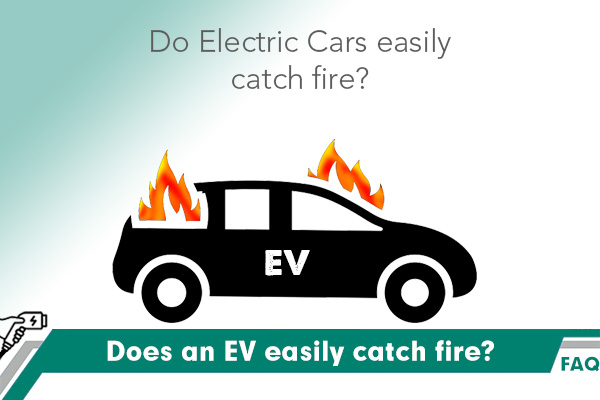
Do electric cars easily catch fire?
People often think that an Electric car will catch fire more easily than a gasoline car. Often triggered by social media and spectacular pictures of incidents. Let’s find out.
However, studies and reports show that gasoline vehicles are much more likely to catch fire compared to electric vehicles.
EV car = Electric Vehicle
ICE car = Internal Combustion Engine (mostly Gasoline / Diesel) car
The Reality
ICE Cars and Fire Risk
In accidents involving ICE cars, the primary concern is the potential ignition of fuel. The liquid fuel, such as gasoline, is highly flammable. If a collision ruptures the fuel tank or fuel lines, it can lead to a fire or explosion. There is a hot engine, and fuel or oil leaks can ignite a fire quite easy.
EV and Fire Incidents
Electric cars are not immune to fire incidents, but the nature of these incidents differs significantly from gasoline cars. Electric car batteries, typically lithium-ion batteries, can catch fire if damaged, punctured, or subjected to extreme conditions such as overcharging or overheating. However, such incidents are relatively rare compared to ICE car fires. An EV has a ‘Battery Management System’ which also prevents overcharging or overheating. The entire electrical system is extremely well secured. As a result, car fires from the vehicle itself, caused by a technical fault, is extremely rare.
In electric cars, the actual risk factor is a high impact at the battery pack, for example due to accidents. If, on that very rare occasion the battery is on fire, it is much harder (if not impossible) to extinguish it.
Investigating the Numbers
* EV FireSafe, an Australian company, studied global data on the reports of EV fires from 2010 to 2022, concluding that there was a 0.0012% chance of a passenger EV catching fire, compared to 0.1% for an ICE vehicle.
* Another report by US-based Autoinsurance EZ actually suggested hybrids were the most likely to catch fire, concluding:
Hybrid – 3,474.5 incidents per 100,000 vehicle sales
ICE – 1,529.9 incidents per 100,000 vehicle sales
EV – 25.1 incidents per 100,000 vehicle sales
This data shows that EVs are about 0.3% likely to catch fire, whereas ICE cars are 1.05% likely to ignite.
They accumulated American based data from reputable sources, including the National Transportation Safety Board (NTSB), Bureau of Transportation Statistics (BTS), and government recall data from Recalls.gov.
* Tesla’s 2020 Impact Report (pg 40) states:
Fire incidents are approximately 11 times lower for Tesla vehicles than the average vehicle in the U.S.
Tesla EV – 1 fire for every 205 million miles traveled.
ICE vehicle – 1 fire for every 19 million miles traveled.
* A report in May 2023 by the Swedish Contingencies Agency, found vehicles powered by ICE were 20 x more likely to catch fire than EVs in Sweden.
Conclusion
Although the numbers of the mentioned investigations might not be exactly the same due to the methods they use, we can conclude that EV’s are undeniably safer than ICE cars when it comes to the possibility of a fire. Electric cars are not fireproof, but next time you hear someone claim that EVs will burn down houses, remember the data – gasoline (ICE) cars pose a far greater fire risk.
The downside of EV car fires is, that it can be much harder to put out than gas car fires. A large amount of water is required to extinguish the battery pack once it starts burning (reports have indicated that extinguishment of fires in ICE cars require up to approx. 4,000 litres of water, whereas EV cars can require up to forty times as much).
References
EV FireSafe
Gas vs. Electric Car Fires [2024 Findings] | AutoinsuranceEZ.com
Tesla’s 2020 Impact Report
Report in May 2023 by the Swedish Contingencies Agency
You might also check out:
Government data shows gasoline vehicles are up to 100x more prone to fires than EVs
Plug-in electric vehicle fire incidents – Wikipedia
